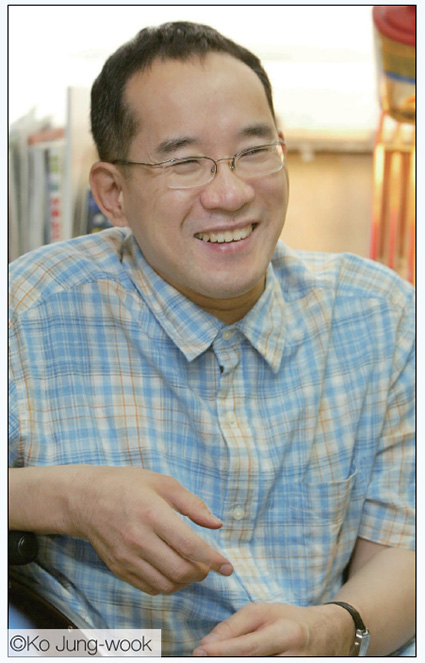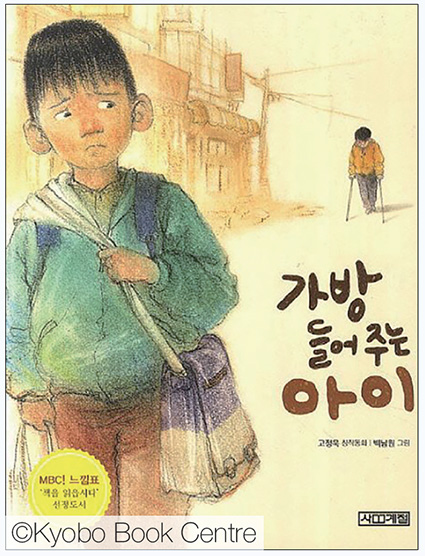
The book series Feisty Jae-seok which many people would have read when they were in school, is a story of the growth of the main character, Jae-seok. It contains examples of problems that are usually experienced by the youth, such as games, money, and grades. The story of a disabled student and a friend who carries his bag, The Boy Who Carried the Backpack, has sold more than 1 million copies and is considered a book that parents should read too. The author of these books, Ko Jung-wook, has written hundreds of children’s stories and youth books. He is also giving numerous lectures on the theme of “For the World We Live Together.” What is the message that he wants to tell the world?

Q1. Please introduce yourself.
Hello. My name is Ko Jung-wook, I am a physically challenged person in a wheelchair. My job is as an author, and I have written 355 books which is more than any other Korean author. About 5 million copies of my books have been sold, and some of them are included in elementary, middle, and high school textbooks. I have been a writer for 34 years now.
Q2. What made you become a writer?
You may think I have prepared a lot to become an author since I was young, but in fact, I never thought that I would become an author. I have always liked machinery and science because of my aptitude for natural science. Hence, when I was in high school, I wanted to enter the College of Medicine or Engineering. I thought “I have a disability, but would not it be okay if I just studied well?” However, I was informed that students with disabilities could not enter the College of Medicine and Engineering. The reason was that I have too severe disability. My homeroom teacher suddenly asked me to change to liberal arts, and my father submitted a university application to Sungkyunkwan University’s Dept. of Korean Language and Literature, which had the lowest competition rate. I got into the university, and I learned Korean literature for the first time. Consequently, I started writing and dreaming of becoming an author when I was a freshman, at the age of 20. Twelve years later, in 1992, one of my novels was elected to the Munhwa Ilbo annual spring literary contest, and I started my career.
Q3. What made you write the Feisty Jae-seok series?
When I became an author, the novel market rapidly decreased because of the Internet. In consequence, I started writing children’s stories. The Boy Who Carried the Backpack, My Very Special Brother, and Guide Dog, Tansil were loved a lot as bestsellers. One day, the publisher suggested writing books for teenagers. Actually, there were not many youth books at that time. I thought it would be nice if the main character, who causes problems, could represent the concerns of middle and high school students, so I created the character, Jae-seok. This book gained more popularity than I thought, and it became a bestseller. The publisher asked me to write the second and third parts, so I kept writing it. So far, there are 9 episodes. I plan to write the 10th episode this year.
Q4. It seems like you have an interest in youth issues. What do you think is the most serious youth problem nowadays?
Teenagers are the future of the country, so I think they should grow up well. In the past, teenagers had concerns about grades, the opposite sex, violence, and bullying. However, now new problems are occurring as society is industrialized, advanced, personalized, and the Internet is spreading. These include gambling and drugs. Thus, I want to write books about these problems, but it is challenging since it could not have been imagined in the past. These days, I think the biggest problem is that students are already in debt before going into society because they gamble on their smartphones and easily borrow or lend money, while teenage addiction is even a reality for students in high school.
Q5. What is the solution to these problems in your opinion?
These are difficult problems, so the whole society must consider them together. I think education needs to be changed. When I attend a lecture at school, I think education is in a crisis. Most students’ literacy is poor, and they have no dreams, so they have no place to relieve themselves because they are living solely for grades and college rankings. Their friends are competitors, and their parents scold them for their poor grades. I think the biggest problem is that teenagers are unable to have fun at school and grow up through education. Parents also form a society that focuses on educational background, telling children to go to a good college regardless of their dreams. They are unable to think realistically and are confined in a passive mindset. After all, they do not know how dangerous it is, and they encounter drugs and gambling without anyone stopping them. Society is in a difficult situation due to the recession and so on, so we are not even aware of the problem yet. I would like to suggest two solutions: educational reformation and a realistic and practical way of thinking.
Q6. A CBT reporter thinks it is not easy to reveal your heartbreaking stories in a book that anyone can read like The Boy Who Carried the Backpack. How do you feel when creating these works?
When writers first start, they write with what they know best. My children asked me why I did not write children’s stories when they were young. Then, I went to the library and found that there were countless children’s books. I was thinking about it because there was no new source for me to write. I thought, “What do I know best?” and that was my disability. The first book I wrote after that was My Very Special Brother, and it was very loved. In fact, I think that by writing these heartbreaking stories, the author comforts people who have the same pain and provides an opportunity to tell people that there is such pain in society. Rather, I think that my painful experience and this difficult environment in which I have to live as a disabled person are the source of my works that I am very grateful for as an author.

Q7. Discrimination against people with disabilities is still serious in our society. What do you think about this problem, and what are your solutions?
Discrimination is instinctive. For example, if natural enemies chase after humans, what kind of prey will they aim for? They will attack weak humans. If you are next to them, you can be attacked, too. Humans are the rulers of the whole earth now, but those instincts are still there. That is why I think discrimination occurs. To solve this problem, we need to educate ourselves that it is wrong behavior and that humans are social animals that help each other. It is said that 10% of the population in Korea is disabled, but you may feel like less than 1%. This is because disabled people cannot go around freely, so they stay at home. To overcome this discrimination, you have to go and meet them and think that they are not different from you. Is it necessary to discriminate if there are disabled people in literature, dramas, movies, and plays, or when they are seen on the street and in school? My answer is NO, because then people will know a lot about disability. I think discrimination will be resolved only in a world where we hang out often and live together.
Q8. What are your plans and goals for the future?
I have clear plans and goals. Firstly, I aim to publish 500 books. Currently, I have published 355 books, so I only need to release 145 more to reach my goal. Secondly, I aspire to publish books in 100 countries around the world. I have already published works in several countries. Lastly, I hope to receive the Nobel Prize in Literature. It evaluates what kind of life the author has lived, and how the author has contributed to and changed the world. I believe it is something achievable, and I am diligently working.
Q9. Lastly, what would you like to say to the readers?
I am sure many college students read it, and you might have a lot of worries about your future path. You may have some social pains, too. However, I understand all of it. I did the same thing. Dreams change, just like mine did. They must be changed! Look at the world as a playground, not as your contender. What if the kids do not like it while they are on a slide? They move on to a swing. If it is not fun? They get on a seesaw. They play like that and then go home. That is life. You can try everything and find what suits you. My favorite quote is “No pain no gain.” If you are willing to suffer, work, sweat, and bleed when there is something you want, you will be able to move forward with your dreams. Do not be swayed by the dreams that adults have set and think about what kind of rides you will try at the playground of life.
The last thing I want to say is, I hope to meet you at the summit. “See you at the top!” If a reader of CBT came to me about 10 years later and said, “I read your interview and achieved my dream.” Then, there is nothing more to wish for.
By Seok Yeon-ji
duswl1102@chungbuk.ac.kr


 All
All People
People






 Seok Yeon-ji
Seok Yeon-ji











